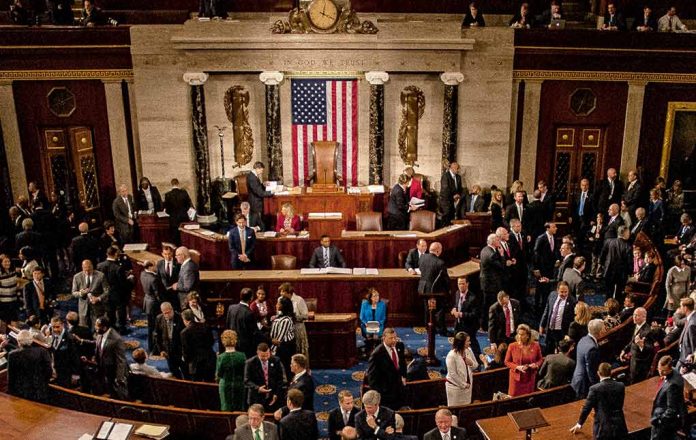
Senate Republicans overwhelmingly rejected a resolution to end President Trump’s trade war, signaling solid support for his economic strategies despite concerns about rising consumer costs.
Key Takeaways
- Sen. Rand Paul’s resolution to terminate President Trump’s “emergency” declaration for tariffs failed in a tie vote of 49-49.
- Only Republican Senators Collins and Murkowski joined Paul in voting for the resolution, demonstrating strong GOP unity behind Trump’s trade policies.
- Vice President JD Vance cast the decisive vote to table the measure, preserving Trump’s authority to impose 10% tariffs on most U.S. trading partners.
- The vote represented a crucial test of whether the Senate would challenge the president’s unilateral trade powers.
- Even with strong Republican backing, some analysts suggest this close vote may indicate the beginning of Trump’s waning influence over Congress.
Republicans Stand Firm on Trade War
Senate Republicans demonstrated their firm commitment to President Trump’s trade policies by defeating a resolution aimed at terminating his national emergency declaration on tariffs. The 49-49 tie vote preserved Trump’s authority to impose 10 percent tariffs on imports from most U.S. trading partners. Vice President JD Vance cast the deciding vote to table the measure, effectively killing it. Only Republican Senators Susan Collins of Maine and Lisa Murkowski of Alaska broke ranks to support the resolution sponsored by Kentucky Republican Rand Paul.
The emergency declaration provided the legal foundation for Trump to implement broad tariffs, based on the claim that imports pose an “unusual and extraordinary” threat to the United States. Senator Mitch McConnell from Kentucky and Democratic Senator Sheldon Whitehouse from Rhode Island both missed the vote, though McConnell’s office indicated he “has been consistent in opposing tariffs and that a trade war is not in the best interest of American households and businesses.”
#BREAKING: Senate rejects measure to block Trump tariffs — 49-49 pic.twitter.com/Z2Snx5G0RV
— Backfire (@BackfireBros) April 30, 2025
Constitutional Questions and Republican Unity
The vote represented more than just a policy decision – it highlighted questions about executive power and congressional authority over trade. Senator Paul framed his resolution as a defense of constitutional principles rather than simply an economic policy dispute. During debate, he emphasized the broader implications of allowing expanded executive authority unchecked by legislative oversight.
Despite Paul’s constitutional arguments, most Republican senators remained firmly aligned with
Trump’s economic vision. The strong party unity demonstrates the political reality that few Republicans are willing to publicly oppose the president’s trade agenda, even as some privately harbor reservations. Senator Paul noted during the debate that many of his Republican colleagues privately disagreed with Trump’s trade policies but were cautious about publicly opposing the president.
Shifting Power Dynamics
While the vote’s outcome preserved Trump’s tariff authority, the close margin suggested possible limits to presidential influence over Congress. Kent Lassman of the Competitive Enterprise Institute observed that the narrow result might indicate an evolving relationship between the executive and legislative branches. The vote exposed potential cracks in the president’s ability to maintain total GOP unanimity on his economic agenda.
Even had the resolution passed the Senate, it faced significant obstacles. Trump had threatened to veto any legislation challenging his trade authority, and procedural hurdles in the House would have made final passage difficult. The Senate’s decision reflects both political calculation and a broader reluctance among Republicans to directly confront the president on his signature economic policies, which many see as central to his “America First” agenda designed to strengthen domestic industries and protect American jobs.
Sources:
Senate GOP leaders succeed in protecting Trump tariffs
Senate Republicans Voted Overwhelmingly To Continue Trump’s Trade War
Senate Rejects Bipartisan Measure to Undo Trump’s Tariffs







